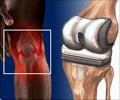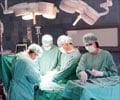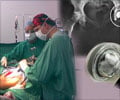For many suffering from osteoarthritis, knee surgery could prove a cure worse than the disease. Physiotherapy and mild pain relievers more effective in reducing the pain, a Canadian-led study says.
For many suffering from osteoarthritis, knee surgery could prove a cure worse than the disease. Physiotherapy and mild pain relievers could be more effective in reducing the pain, a Canadian-led study says.
But the researchers did not conclude that arthroscopic surgery is useless, because it did help a minority of patients with milder symptoms, large tears or other damage to the meniscus — cartilage pads that act like shock absorbers between upper and lower leg bones.Treatment decisions should be individualized, and the surgery is still appropriate for patients whose primary cause of pain is not osteoarthritis, experts stress.
Osteoarthritis is the most common form of arthritis, affecting one in every 10 Canadians and 27 million Americans.
Symptoms usually begin after age 40. Cartilage breaks down at the end of bones, causing them to rub together at joints, leading to stiffness, pain and limiting movement, such as walking down stairs.
In Thursday's issue of the New England Journal of Medicine, Dr. Robert Litchfield of the University of Western Ontario concluded that routinely practised knee surgery is ineffective at reducing joint pain or improving joint function in people with osteoarthritis.
"We compared these patients through two years and really didn't find any difference in the group that had the addition of the surgery," Litchfield said. "I really think it tells us that we need to focus our attention on other types of treatment."
Advertisement
- Weekly therapy for three months to strengthen knee muscles.
- Instructions on exercises to be done twice a day at home.
- Medications such as ibuprofen, acetaminophen, glucosamine or chondroitin supplements, and injections of a knee lubricant, depending on the severity of pain.
Advertisement
For the Canadian orthopedic surgeon Dr. Craig Stone, the findings confirm doubts he had about the benefits of knee surgery for osteoarthritis patients.
Stone said surgeons will probably be less likely to scope knees of osteoarthritis patients, except for a small subgroup.
Steve Studenny turned to arthroscopic surgery for relief from his pain. He had surgery on one knee and physiotherapy on the other. Both knees "were killing," but only one has improved.
"The one that we did not do the surgery on," Studenny said. "The one that we had the scope on is still hurting."
Arthroscopic surgery for osteoarthritis has been associated with worse outcomes than therapy, Dr. Robert Marx of the orthopedic surgery department at the Hospital for Special Surgery in New York noted in a journal editorial.
A second study in the same issue looked at MRI knee scans from 991 randomly selected people, aged 50 to 90, from Framingham, Massachusetts. About one-third had a tear or other damage to the meniscus. Nearly two-thirds of people with torn knee cartilage had no pain or stiffness in the previous month.
In those cases, surgery "probably isn't terribly helpful, compared to just medication and physical therapy," said Dr. David Geier, a spokesman for the American Orthopedic Society for Sports Medicine.
There may be a misperception that arthroscopic surgery in people with arthritis could prevent the need for major knee surgery down the road, but the latest findings "might change that opinion a little bit," Geier said.
Source-Medindia
GPL/M









